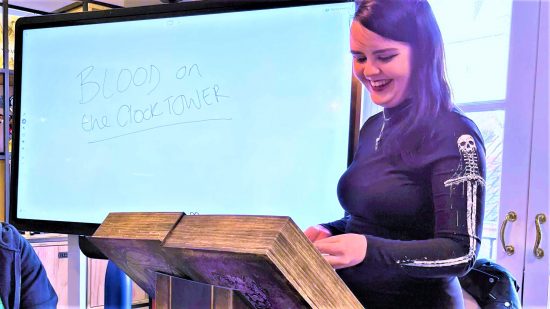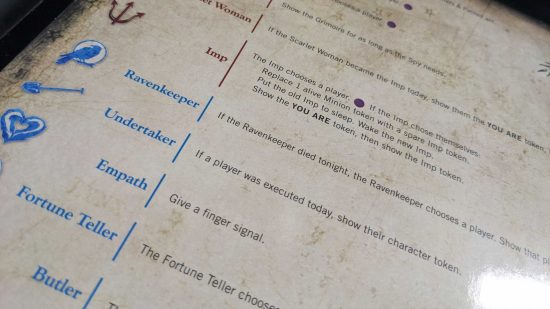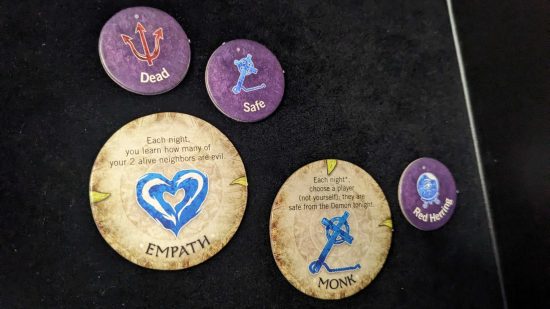Our Verdict
There is no social deduction board game quite like Blood on the Clocktower. It solves many of the genres previous problems, and its unique atmosphere and gameplay have sparked a passionate community of players. Varied, complex, and thoroughly engaging from start to finish, it's a title you'll want to play again and again and again.
- A quality physical product
- Excellent balance of theme and mechanics
- Extremely addictive and replayable
- Flexible to all kinds of player groups and play settings
- Sets a new bar for games of this genre
- Complex for new players (but not offputtingly so)
- An expensive investment, even if the value for money is high
There are few true game-changers in the tabletop world, but Blood on the Clocktower is one of them. It expands on the tried-and-tested social deduction game formula, sharpening its edges until it gleams like a blade. Tense and atmospheric in one moment, then comically chaotic in the other, it deftly balances theme and complex strategy. With this game in my life, I may never play Werewolf again.
I’ve shouted about Blood on the Clocktower before, calling it the perfect Halloween board game. But Wargamer needed a full Blood on the Clocktower review to explain why this title deserves the crown of ‘best social deduction game’. Before we begin, a small bit of housekeeping: when testing this game, I used a copy that was kindly provided by the publisher, but it did not influence my opinions.
We’ve started with a bit of honesty, but Blood on the Clocktower is full of lies and betrayal. Time to unleash its darkest secrets.

What is Blood on the Clocktower?
As we already mentioned, Blood on the Clocktower is a social deduction game that shares mechanics with titles like Werewolf, Avalon, Secret Hitler, and many, many more.
The basic concept is a familiar one: an evil team must kill the majority of the good team to win, and the good team must discover and execute the killer before they’re wiped out. Everyone has a secret role with unique abilities, and they must talk to their fellow players to figure out who’s who. Murders take place at night (when everyone’s eyes are closed), and executions only take place if the majority of players agree in a vote during the day.
With so many competitors, Blood on the Clocktower needed to do something special to stand out. There’s plenty that makes this game unique, but its most distinctive feature is how it handles death.
In most social deduction games, players are unable to speak or act after their character has died. You can no longer use your role’s powers if you die in Blood on the Clocktower, but you can still speak and continue your investigation. And you get one final ‘ghost vote’ if you’re determined to execute a particular player.
What’s in Blood on the Clocktower?
The box for Blood on the Clocktower is itself a part of the game. When opened, its two sides can be clipped together to form a Grimoire. This will be guarded by the Storyteller, a player chosen to run the game for everyone else.
To set up a game, the Storyteller can choose from one of three ‘scripts’. Each script comes with a different set of player roles, and this variety gives each script a unique play style. Trouble Brewing is balanced and beginner-friendly, while Sects and Violets presents a more bombastic mystery.
The Storyteller also has a set of Traveler and Fabled character roles. Travelers can be used to create more roles for an especially large group of players, or they can be assigned to a player who arrives late or needs to leave early. Fabled roles are immortal characters run by the Storyteller, and they’re designed to help the game accommodate certain scenarios. If you want to be more welcoming to new players or ensure the game finishes on time, throw a Fabled in the mix.
The Storyteller decides which roles will be used for a game, and then everyone else pulls a role token at random from a bag. They view their role in secret, and then they return this token to the Storyteller. Each token comes with a velvet back that helps it stick to the inside of the Grimoire. This helps the Storyteller track who is who, and they have a small army of other tokens that can track conditions or events that influence play.
Thanks to the large number of possible roles in a script, Blood on the Clocktower can be played by five to twenty people – plus one storyteller.
How does Blood on the Clocktower play?
Blood on the Clocktower is a phenomenal experience – for many reasons.
What’s most impressive about this dark grimoire is how it expands the social deduction genre. Blood on the Clocktower kills off any weakness the genre held onto previously. Gone are the days when dying on the first night meant sitting out of the game entirely, and useless character roles that leave you twiddling your thumbs are ancient history.
Everyone has a part to play in Blood on the Clocktower. Some roles give the good team ways to gather information, while others sport impressive one-off abilities.
Some roles won’t wake up and perform acts in the night, and there are plenty that are simple to play. But they’re just as vital, allowing good players to establish safe allies – or evil players an easy bluff to hide their true identity. Not everyone on the side of good is helpful, too. Outsiders still want to vanquish evil, but their powers cause more harm to the innocent than good.
Meanwhile, the evil side has its own tricks. Only the Demon role lets you kill a person, but the Minions play an equally important part, gathering information for their master, interfering with the abilities of good players, and directing attention away from the real killer. As if that wasn’t enough, the more advanced scripts come with several different Demon types – so the good players must figure out what they’re fighting as well as who.
A clever storyteller can create an intricate web of deception. Dead Demons might not really be out of the game. Someone might believe they’re one role when they’re actually another. A different person can take on the role of the demon, and making the wrong statement can kill some players on the spot.

The chaos and confusion this causes is thrilling. Some players will meticulously follow each thread of information to uncover the truth, while others will leap upon a statement with shouts and pointed fingers if they don’t believe the speaker. You don’t even need to stay in your seat – if you trust a particular person more than the others, you can squirrel yourself away in the corner and plot in private.
Amongst the killing and the sleuthing, the Storyteller stands mostly silent, orchestrating the whole thing. The luxurious Grimoire, coupled with long nights of tension when your eyes are closed, make the game as thematic as it is strategic. Whatever role you take on, Blood on the Clocktower allows you to appreciate its perfect balance of atmosphere and gameplay.
Each script has a vast number of possible role combinations, and when you tire of one, you can try the next. This makes Blood on the Clocktower endlessly replayable, and it can seamlessly accommodate player groups of any size or experience level. Even late-comers and early departures are welcome in this murder-crazed town.
For a game that’s all about betrayal, Blood on the Clocktower has a wonderful way of bringing people together. Its finale creates an enormous swell of relief, where everyone’s roles are revealed and the players can discuss their theories and tactics openly.
This camaraderie isn’t an isolated incident, either. An entire community of Blood on the Clocktower players has formed, with a legion of Storytellers organizing regular games at conventions and board game stores all over. Online, fans share strategies and homebrew scripts that create even more reasons to come back for one more game.
The experience is addictive, and I speak from experience. In 2023, my local board gaming group played a game of Blood on the Clocktower almost every week. It’s the definitive social deduction game, and for me personally, it might just be the best board game of all time.
Who is Blood on the Clocktower for?
Anyone who enjoys social deduction games should play Blood on the Clocktower at least once. That being said, while I think everyone should play it, not every board game fan should own a copy.
There’s one simple truth that can’t be denied – Blood on the Clocktower is a complex game. It’s perhaps the most elaborate social deduction game out there, and the sheer amount of roles and rules can be overwhelming for new players. The challenge is even greater for newbie Storytellers, who must manage everyone else while making as few rules mistakes as possible.
Despite this steep learning curve, most players aren’t put off by their first experience with Blood on the Clocktower. In my experience, it’s quite the opposite. New players are incentivized by the murky mystery they face. Even if they didn’t quite understand what was happening in their first game, by then they’ve smelled blood in the water. And they want more.
Lovers of simplicity may want to stick to easy card games, and that’s a fine and dandy decision. But the willingness so many new players have to muddle through complexity proves how powerful a game Blood on the Clocktower is. Complexity is a design choice rather than a flaw.

You’re also not alone when learning the game. The vast Blood on the Clocktower community has all sorts of tips and tutorials to guide a new player or storyteller, and there’s even an entire wiki dedicated to learning about the game’s roles and strategies.
The only other drawback is the price. Blood on the Clocktower retails for $148.95 (£119), so it’s far from a cheap board game. Social board gamers who are used to buying budget copies of One Night Ultimate Werewolf might balk at such an investment.
For the veteran social deduction gamer, however, the price is more than fair. The Pandemonium Institute has struck gold with its first tabletop title. This immense game works as well at parties as it does hardcore hobby nights, and the whole thing is packaged in a gorgeous, glossy box. Lying has never looked or felt so good.
Update: This article originally called ‘Bad Moon Rising’ a beginner-friendly script, but this was an error. A correction was made on May 8.



